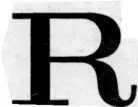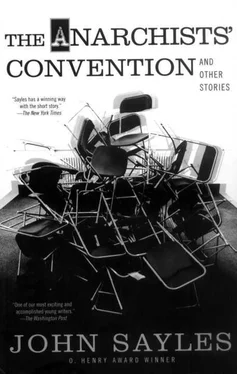Kim told her to have the round-eye operation. If she ever wanted to get an American boyfriend, to be able to become a citizen and get papers so she could have a nice job, she would have to have her eyes changed. That was how they wanted it. Tan said she was interested, but kept putting it off.
One morning Mr. Thuong came out from listening to the news and began to paint the bottom half of the Vietnam map red. There were tears in his eyes as he painted. At least, he said, it is all the same color now. It was that morning Tan decided for the operation.
Kim showed her the ad for the plastic surgeon in the yellow pages, a big ad with a picture of the doctor. Tan recognized his face.
Tan lies in the reclining chair wondering what he'll do. If he'll remember her. If he'll steal it from her or give her to the police. But one way or the other, she'll be free of it. The last of Vietnam locked inside her, next to her heart, will be gone.
The doctor comes in rubbing his hands on a towel. Tan catches her breath, tries to look calm. She wonders what she'll do when her eyes are round and unguarded.
Hello Tan, says Dr. Yin. I've been expecting you.
Children of the Silver Screen

AIN BLASTS THE STREET, each gray bullet bouncing up a half-foot from the pavement before it disintegrates. There is a loud, flat smacking from the posters on the wall. Black tears stream from
Bogart's eyes, strings of ink dribble from his cigarette and gun. In the background a burro smears into desert sand.
Shine unlocks the glass doors though it is still early. He examines his reflection — forty, pleasant-looking but not handsome. Comic relief maybe, or the hero's older brother. He has always thought of himself as a sidekick, but never found a Duke Wayne to play Ward Bond to. The type that could never carry a picture alone.
The regulars start to trickle in, sniffing and dripping on the nearly bald red carpet, and Shine calls Gerald out to man the tickets. Gerald is deep into Eisenstein today, making change and tearing stubs without looking up, scowling intently at the book in his lap. "Montage," he mutters from time to time, nodding his head. "Montage."
They straggle past him, the buck-twenty-five matinee regulars, stomping their feet and blowing their noses, peeking back uneasily at the storm-slapped doors. Shine slides behind the candy counter and stations himself between gurgling tanks of orange and purple. He tries to guess what each will have, though there is not much to guess at with the regulars. Raisinets are a big mover, as are Black Crows and Chuckles, but the word has spread that the mr. Goodbars are past their prime.
The regulars mill beneath publicity pix of stars past and stars present, touring the lobby walls like penitents making the Stations of the Cross. A tall girl, made taller by the rubycolored platforms she stands on, pops jawbreakers with her back teeth and wrinkles her nose at Carmen Miranda. The ruby is repeated on the girl's fingernails and wide, painted mouth, her polka-dot blouse is cinched in at the waist and puffed at the shoulders. Carmen Miranda smiles back, topheavy with fruit, face frozen in a wink. Hard candy crunches, plastic jewelry clacks and the tall girl hums the opening to "Give Me a Band and a Bandanna." Catholic Prep boys, four of them, fidget and jostle in the middle of the floor and periodically bust out laughing at some enormous adolescent in-joke. A shifting, self-conscious island, they pace in their blue-nylon school jackets, flitting their eyes to the full-length lobby mirror with each pass and swiping furtively at the hair hanging wet on their foreheads. A very fat girl under an orange poncho drifts near the counter, sighing down into the glass, then tears herself away to stand by the water fountain. Her eyes never leave the bin of too-yellow popcorn. Two young men in tight, bright jean-suits sit on the black Naugahyde couch crossing their legs so their toes nuzzle between them, discussing triumphs and tragedies of the Great Ladies. Marvelous, they say — exquisite. It is all Marlene, Bette and Babs with them, Judy and Barbra and Joan and of course Poor Marilyn. They share a box of wintergreen Canada Mints and jiggle their matching two-tone saddle shoes. A thick-bodied old woman in tweeds enters, shaking droplets from her long, black umbrella. She sees Shine behind the counter and comes over to express her condolences.
"You've given us all a great deal of pleasure," she says, "I think you should know that we appreciate it."
They blow in, the Jujyfruits and Almond joys, junior Mints and Planters nuts, they grin and wince into bad Bogart impressions, they match wits naming the Magnificent Seven, or the Seven Dwarfs, or the seven major Golden Age studios. Dopey, they say, Warners and Universal. Steve McQueen and Charles Bronson, they say. Grumpy. A boy who looks like the Spirit of Che Guevera does a soggy soft-shoe in front of the men's-room door. The fat girl in the poncho tumbles for a box of popcorn, large, with a nickel's extra butter. A boy in a cape and a girl with a yellow slicker do a brief exchange from a Marx Brothers' picture and the young men on the couch roll their eyes and cluck their tongues. Old Pudge comes out from the projectionist's booth and nods to Shine. The lobby empties into the theater.
Shine flicks switches and the tanks of orange and purple settle, the yellow bulb in the popcorn machine goes out. A girl in an Army fatigue jacket comes in sopping and pays Gerald in quarters and dimes. She asks Shine for Good and Plentys, then rattles them loudly inside the box. "Lotta leg room in there," she says and grins. A boy with a bad complexion and an armful of books sheltered under his coat buys a ticket and then asks what is playing. Shine closes the back of the counter and locks it. The empty street seen through the streaming glass doors has no edges, cars and buildings appear out of focus. The theme from The Treasure of the Sierra Madre begins in the theater and Shine tells Gerald he can go read in the office.
A car washes up in front of the doors and Eddie Pincus — Pincus Jr. - scurries in with a large box in his arms. He passes Shine without speaking, heading for the office. Eddie is wearing a red pointy-collared shirt and plaid pants, shoes with semi-Cuban heels, and rings on all the fingers of his left hand. An Italian-hood type, thinks Shine, down low in the organization. A gunsel. A Dead End Kid pushing thirty. Pincus Jr. comes back empty-handed, goes to the car and brings in another box. Shine counts ticket stubs so their eyes won't meet. Before he leaves for good Eddie reaches over the counter and scoops himself a handful of popcorn, leaving a trail on the carpet.
Inside the theater Bogart and Tim Holt catch up with the labor contractor who has stiffed them. They argue, then fight silhouetted in stark barroom light till the contractor lies bleeding on the floor. The two winners take only what they are owed from his wallet.
Shine brings the stubs and the cashbox to the office. His swivel chair is occupied. "They never picked this up," says Gerald nodding toward two film cans on the desk, "and Mr. Pincus wants you to clear your stuff out today."
Shine leans against the desk and dials a number.
"Mr. Brandt's office, may I help you?"
"This is Mr. Shine? And I'd like to — "
"Mr. Brandt took special pains to see that you received a good print. If there's anything wrong with it then it happened on your end."
"No, see, the print — "
"In fact we're considering charging you for restoration of a few we've gotten back from you — "
"The print is fine."
"there is also some evidence of extra screenings not provided for in our agreements. Film is a delicate medium, Mr. Shine — "
Читать дальше













